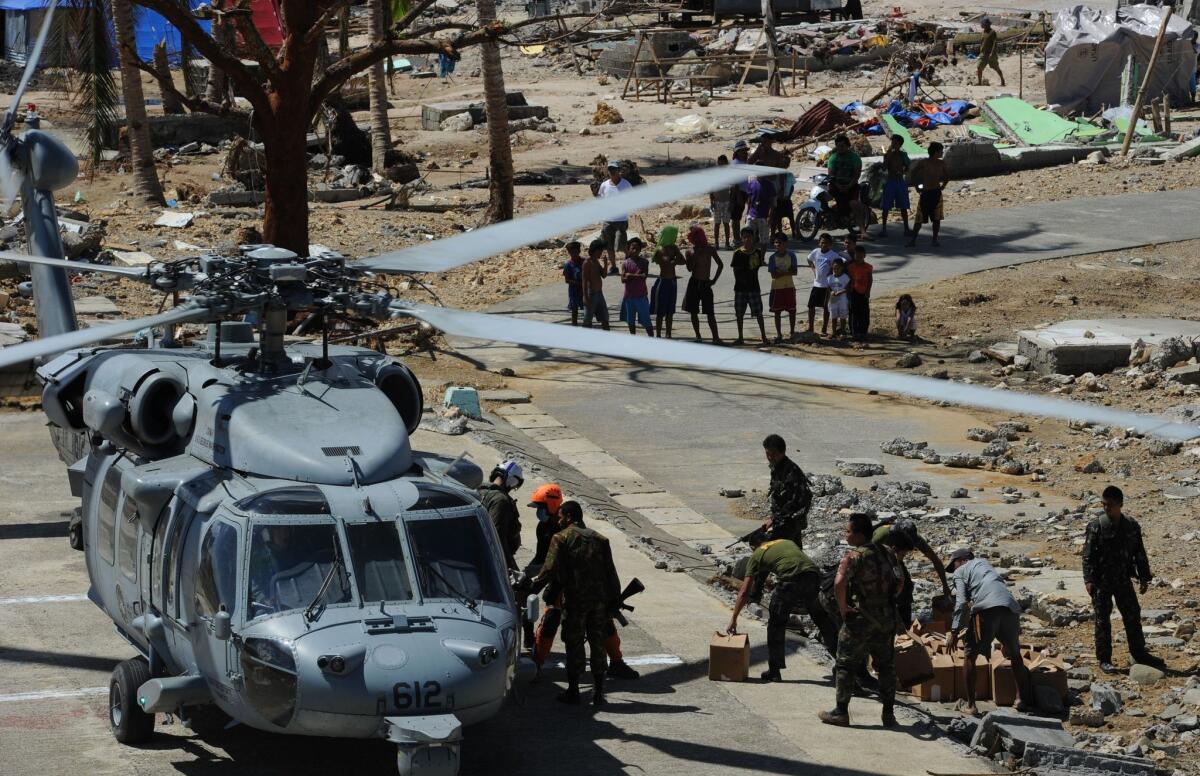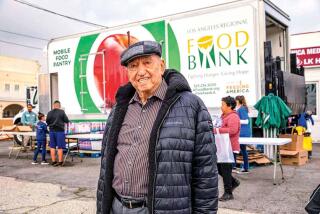U.S. leads Philippine disaster relief but most Americans unengaged

- Share via
One in three overseas Filipinos lives in the United States and the U.S. government is leading the international relief effort after Typhoon Haiyan, but most Americans are tuned out of the disaster’s aftermath, the Pew Research Center reported Tuesday.
A Nov. 14-17 survey of 1,013 U.S. adults found less than a third of them were following the tragic consequences of the monster storm, the Pew pollsters found.
Even fewer, 14%, said they had contributed to disaster relief, although donations typically tend to be slow in the early days after a devastating storm or earthquake, the researchers noted. An additional 17% of those polled said they planned to send money to help the victims of Haiyan.
General interest in the Philippines tragedy and limited humanitarian response were low compared with Americans’ reactions to other recent disasters, the Pew report said.
After the earthquake-triggered tsunami and nuclear disaster in Japan in March 2011, 55% of Americans surveyed by Pew said they were closely following the plight of the Japanese. In 2004, 58% of those polled said they were watching coverage of developments in the wake of the Indian Ocean tsunami, and 60% of Americans asked about the 2010 earthquake in Haiti said they were tuned in to the tragedy.
The researchers drew no conclusions as to why the Philippines’ disaster has failed to galvanize as much empathy or charitable response as other recent disasters, especially given the close political ties between the two countries and the presence of 3.4-million Filipinos in the United States. The report said only that the story drawing most attention among U.S. citizens during the week of the survey was the troubled rollout of President Obama’s Affordable Care Act.
Since the typhoon hit central Philippines islands on Nov. 8 with record wind force, nearly 4,000 people have been confirmed dead and the toll is expected to rise as debris is cleared and searches for the missing are exhausted.
On Tuesday, the National Disaster Risk Reduction and Management Council raised the official death toll to 3,982, and said 4-million people whose homes were destroyed were living in emergency shelters.
The death tolls for the Haiti, Japan and Indian Ocean tsunami disaster were considerably higher.
Meanwhile, the White House reported Tuesday that it has contributed $37 million to Haiyan relief so far and delivered food, water, shelter materials and hygiene kits for about 100,000 people. The Obama administration also posted online information about how Americans can help in the crisis.
The U.S. military deployed the aircraft carrier George Washington and its attendant vessels to the region, where the ship’s 21 helicopters have been ferrying relief supplies and assisting in search-and-rescue operations since arriving Thursday, the White House said in the report on U.S. assistance.
More than 9,500 U.S. military personnel are now helping with aid distribution, communications and utility restoration and getting key airports up and running to ramp up relief to the hardest-hit areas, the government said.
“Our Philippine ally is responding to one of the largest disasters its country has ever faced, and we have been coordinating closely with them at every step,” the White House said.
Two U.S. amphibious ships, the Ashland and the Germantown, are also en route to the Philippines to bring the 31st Marine Expeditionary Unit from Okinawa, Japan, as well as heavy engineering equipment such as backhoes, dump trucks and wreckers needed to support the response, the government statement said.
A British carrier, the HMS Illustrious, is also headed for the Philippines with seven helicopters and a fresh-water production plant on board, the Ministry of Defense has announced.
ALSO:‘Selfie’: 2013’s word of the year
Germany’s shamed ‘Bishop of Bling’ pays fine to settle court case
Iranian Embassy targeted in Beirut bombings; diplomat among dead
Twitter: @cjwilliamslat
More to Read
Sign up for Essential California
The most important California stories and recommendations in your inbox every morning.
You may occasionally receive promotional content from the Los Angeles Times.









